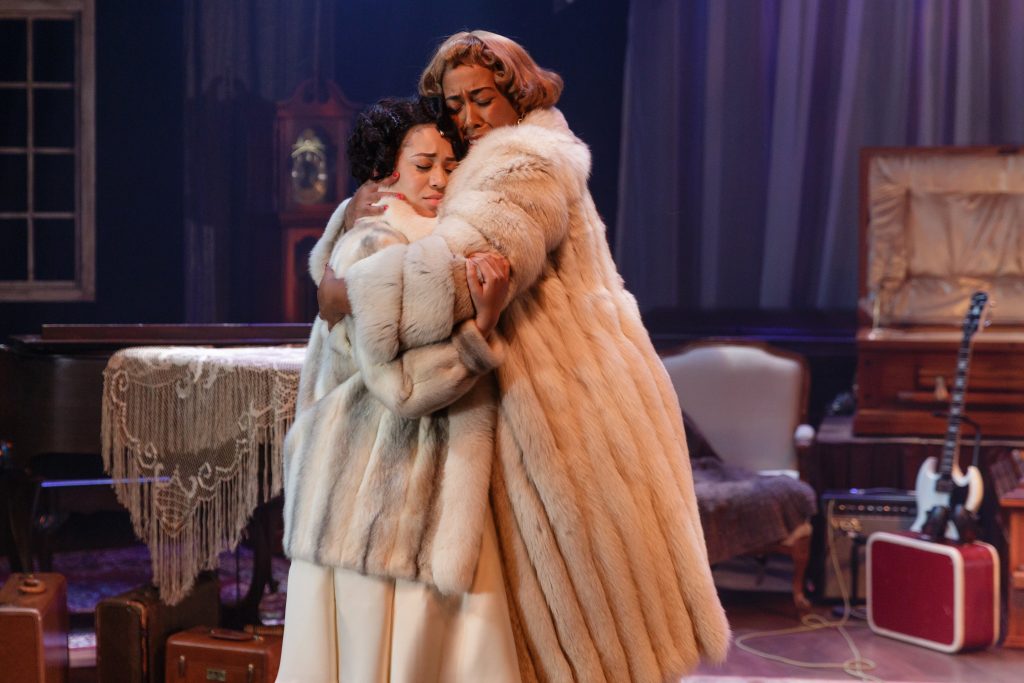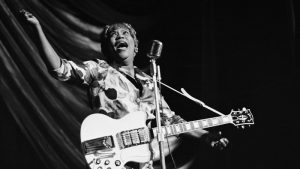Threadbare Writing Hobbles Cygnet’s Wannabe Bio ‘Marie and Rosetta’
Modern gospel stylist Sister Rosetta Tharpe was inducted into the Rock & Roll Hall of Fame in 2018 — and if her followers’ pedigrees are any indication, the honor is a little late in the game. Eric Clapton and Keith Richards couldn’t get enough, sitting mesmerized at one of her concerts in 1963. Elvis, Chuck, Jerry Lee and Jimi freely nodded to her influence as their careers unfolded. She toured Britain with Muddy Waters in 1957 and happened on Little Richard Penniman singing her songs ten years before, when she was just 32.

Amid their embrace, Marie Knight (Amaiya Holley, left) and Rosetta Tharpe (Noel Simone Wippler) know exactly where they’re headed. Karli Cadel Photography image.
“God don’t want the devil to have all the good music.”
Strangely, that’s about as anecdotal as things get in a sketch that, for all its nice musical treatments, never really plumbs sister’s depths.
The play centers on Tharpe’s first rehearsal with pianist protégé Marie Knight as the two prepare for a 1946 Mississippi tour that would fuel their place in history. They have plenty to chat about, wherein it’s seen that Knight is all of 23 and is married with two kids. Tharpe‘s surprise prompts a flinty reference to men as “squirrels” amid her failed marriages — in the same breath, she reveals her compassionate side, calling Knight “pretty enough to stop time” and playfully instructing her in the art of swaying to the music.
My mouth is shut as to Brant’s clever climax, although I frantically applaud the irony in his choice of setting (a dank Mississippi funeral home). It’s locales like that that prompt equally intense paradoxes between characters. But inexplicably, Brant dispenses with the contrasts, begrudgingly drawing hyper-mini-references to Tharpe’s Cotton Club past, her admiration for Cab Calloway and her mixed feelings about the rise of gospel titan Mahalia Jackson.
… [T]heir garden-party chatter [is] devoid of everything that marks characters as characters, let alone music as history.
Literally not a word about her Cotton Plant, Ark. birthplace (not even the name of the town), where the racist Elaine Riot would arguably touch her life at age 4. Not a solitary syllable about her Pentecostal upbringing or bigger issues like just-ended World War II, which surely held a place in her bright, rangy consciousness.
And the bigotry that dotted the mid-1940s Deep South, featuring black migration to northern cities amid wholesale hate crimes? Nothing even remotely illustrative, like the arrest of Irene Morgan, the black teen who refused to give up her seat on a bus 11 years before Rosa Parks?
Rosetta and Marie are nothing more than stencils here, their garden-party chatter devoid of everything that marks characters as characters, let alone music as history. The sins of omission eclipse even those in the recent Always … Patsy Cline as seen at Solana Beach’s North Coast Repertory Theatre, because here, that history is eons deeper.
Amaiya Holley’s Marie and Noël Simoné Wippler’s Rosetta do have a pretty good chemistry — Holley doesn’t let Marie’s deferential nature define the character’s savvy at the keyboard, where she’s clearly the boss; and in Wippler’s hands, kindly Rosetta declines to wear her past on her sleeve in front of the newbie.

Rosetta Tharpe was acquainted with her place in history the minute she stepped onstage. Public media image.
Elizabet Puksto’s great scene design features an open casket that jealously guards its secret until the end of the show, and Chanel A. Mahoney’s costumes depict two unstoppable ladies heading to the same place (witness the broad gowns and the identical fur coats).
Tharpe died in Philadelphia at age 58 in 1973, three years after she suffered a stroke and lost a leg to diabetes. At the time of her death, the late Leon Russell (my patron saint other than Robert Louis Stevenson) had been on the rise in the public mind for about three years, although his studio experience was unrivaled. Leon’s insanely fierce rock piano simply refused to quit amid his gospel-minted inflections — and if any Tharpe-inspired parallel was good enough for him, it’s obviously good enough for little insignificant me.
Accordingly, I was eager to learn more through whatever subtext I could find from Marie and Rosetta. Maybe someday, and with all due respect to director Rob Lutfy, Brant will be generous enough to write it.
This review is based on the matinee performance of Jan. 20. Marie and Rosetta runs through Feb. 16 at the Old Town Theatre, 4040 Twiggs St. in, strangely enough, Old Town. $25-$45. 619-337-1515, cygnettheatre.com.

Martin Jones Westlin, principal at editorial consultancy Words Are Not Enough and La Jolla Village News editor emeritus, has been a theater critic and editor/writer for 25 of his 47 years…
More…
